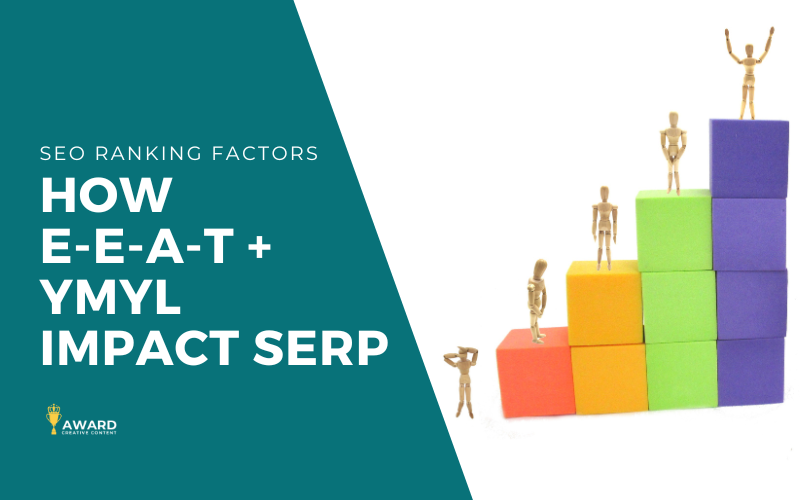The Short Answer:
- If you want to succeed at SEO, your content better be expert caliber.
- That’s easier for some sectors than others.
The Long Answer:
Google’s evaluation of website content increasingly revolves around the principle of E-E-A-T: Experience, Expertise, Authoritativeness, and Trustworthiness.
Created from Google’s Search Quality Rater Guidelines, E-E-A-T significantly impacts how algorithms rank sites. That’s especially the case for those covering sensitive or YMYL (Your Money or Your Life) topics. In late 2022, Google expanded E-A-T to include an additional “E” for Experience, underscoring the importance of firsthand knowledge in content evaluation.
While SEO leaders may sometimes bemoan the often fluctuating world of search, E-E-A-T has to be celebrated by anyone who loves quality content and answers without fluff. Let’s dive into each component to unpack what makes for a successful E-E-A-T effort.

Experience
Google emphasizes content created from direct, personal experience. That means, if you’ve walked the walk, then Google pushes your content up since it assumes you know how to talk the talk.
For instance, a travel article about backpacking in Patagonia written by someone who actually traveled there is more likely to rank higher compared to an assembly of second hand sources. Original content and depth of content on the subject will further help drive home that you or your brand knows what it’s talking about. While not as strong of a score, many niche and expertise focused forums can rank high due to the depth of experience gathered by highly engaged subjects. This is why Reddit often appears at the top of many Google search results as of early 2025.
That’s bad news for the fake it til you make it crowd. Or, anyone just regurgitating content out of AI queries and throwing onto the web. In most cases, those folks will get figured out, with their content receiving the lowest E-E-A-T possible.
Is a lack of experience a deathblow to a page? Not exactly. But, it’ll be tough to come back from.
Expertise
Expertise is the depth of accurate info in the content. High-expertise content goes beyond surface-level information; it includes detailed explanations, original research, and data-supported arguments. For instance, citing recognized experts, peer-reviewed studies, or official data can reinforce the authority of your content.
These efforts are especially critical for YMYL, where Google expects credentials, qualifications and/or demonstrable authority. This is something I and my fellow cannabis content marketing and advertising specialists have run into with our SEO campaigns–with health benefit-focused content under additional scrutiny. And rightfully so.
Not sure if your sector or topic falls under YMYL? Generally speaking, the topics facing higher scrutiny are:
- Health
- Financial Stability
- Safety
- Wellfare
- Well-being
YMYL or not, Google and other leading search engines want to ensure that factual information is presented. Some of the more effective ways to stay authoritative and informative online include:
- Regularly updating content (if applicable)
- Citing reputable sources
- Demonstrating author qualifications (Author bios or an About page can help boost expertise)
While it may be tempting to do an infodump of 2,000-plus words, doing so may not benefit SEO efforts. For several years, these long-form content pieces were all the rage when it came to ranking. Today, while many still are in practice, the shift toward shorter, more digestible content is well underway.
Learn more about AWARD’s search engine optimization and marketing services today!
Authoritativeness
If you’ve been creating content about a subject for months, if not years, and haven’t seen results, your subject authority is likely a factor. Even if you’re the most well-versed on a subject, Google won’t recognize that unless others are championing your name and expertise. Online, that type of public support is best reflected in backlinks.
Backlinks help spread the source’s recognition online. When high-quality content is shared by multiple sources, Google starts to sense that there’s an expert talking. Most people tend to think backlinks apply to only blogs and news features, but those are just two primary methods. Other methods to help establish subject authority can include:
- Taking part in engaging discussions (Reddit, Quora, etc.)
- Getting featured on podcasts
- Viral social media clips
- Create evergreen content that people can use for months or years on end
While backlinks do help build authority, Google uses additional metrics to conclude what page is tops among the keyword. Additional factors considered include content quality, user engagement, and on-page SEO optimization.
Trustworthiness
Trustworthiness forms the cornerstone of E-E-A-T. Even content rich in experience and expertise must demonstrate trust. If it fails to do so, that brand is likely to lose its standing on Google and with the public.
To enhance trust, it’s best to place truthfulness and transparency at the top of the order. Clear communication helps the audience know what’s going on. Mistakes can happen. When they do, sites that correct them promptly may be rewarded compared to those that let incorrect info linger. Additional measures to build trust include:
- A detailed About page
- Displayed contact information
- Transparent privacy policies
- Transparent security measures (High priority for YMYL sites)
- Visible security features
- Positive customer feedback (Claim and/or setup your Google business account if you haven’t already)
- Recognized badges
So What You’re Saying is….?
If you want to rank high on Google, your best bet is to consistently create content that demonstrates you or your brand’s firsthand knowledge and insights into the subject at hand.
Still not sure what this means?
Think of it like this: Would you rather take advice from a beginner who lacks the education and experience to guide your SEO campaigns, or a 10+ year search engine veteran with a track record of success?
In search or otherwise, it’s often best to go with reliable experts.
More Helpful SEO Tips from AWARD CC
Looking for more insights on how to power your brand’s SEO strategy in 2025? Check out some of these recent blogs from AWARD:
- Top Internet Search Engines in America: How to Rank
- SEO in 2025 + Beyond
- How Long Does It Take to Rank on Google?
- What is Cannabis Search Engine Marketing?
- Is SEO Dead?
- SEO for Cannabis Brands: Navigating Marketing Constraints
- How Does SEO Work?
- Going Beyond Keywords and Backlinks
- Why Content Marketing is Important to Business Success




